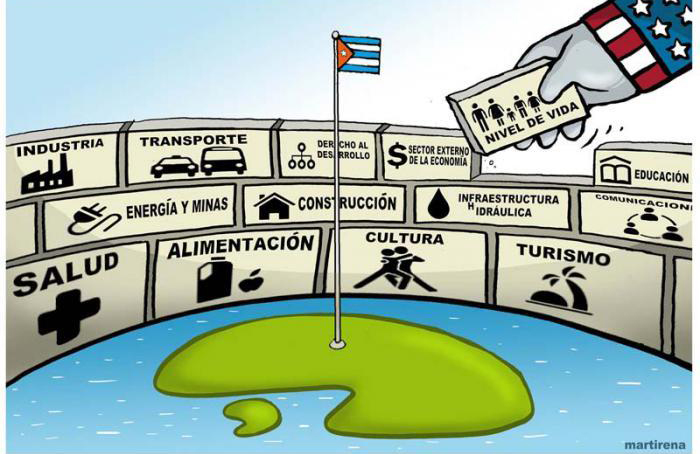It is well known that the blockade imposed on Cuba by the United States is the longest and most meticulous process of economic aggression to which a nation has ever been subjected in history. But this gruesome and dehumanizing war has not remained static; over time, the measures have become increasingly harmful to the lives and well-being of the population.
Year after year for more than six decades, each new US president has faithfully followed what was proposed by the Assistant Secretary for Inter-American Affairs, Lester D. Mallory, when he established the strategy for fighting the Cuban Revolution: “deprive the country of material and financial resources to generate unrest and achieve surrender through hunger, suffering, and despair.”
As stated in the documents of the 8th Congress of the Cuban Communist Party: “The Trump administration took advantage of the pandemic and the economic crisis it created to make it nearly impossible for foreign currency to enter our country at a time when Cuba was bleeding financially to death in the face of the disease.”
Precisely during that difficult period, the inhumane nature of the blockade became evident in all its cruelty, when the main medical oxygen production plant broke down at the peak of COVID-19 cases on the island.
Two US companies attempted to supply this resource to the country, but it proved impossible due to the US government’s requirement for specific licenses, even during the terrible epidemic.
Likewise, the partisan gathering explicitly condemned one of the most significant actions, due to its level of cruelty and its inadmissibility under international law: Washington’s efforts, since April 2019, to deprive Cuba of fuel supplies and thereby cause the resulting impacts on electricity generation that the population is currently experiencing.
As part of the negative progression of the imperial siege, numerous Cuban families are experiencing the cancellation of consular services in Havana and their relocation to third countries; the impediment of banking transactions; and the closure of Western Union operations, which hinders the normal flow of remittances, to cite just a few examples.
However, in an attempt to undermine the devastating scope of the White House’s policy toward Cuba, attempts have been made to portray the sanctions imposed as an embargo. But as statements by many analysts prove, its application corresponds to measures typical of wartime conditions, contemplated within the aggressor nation’s own legal framework.
In this regard, Dr. C. Magda Luisa Arias Rivera quickly clarified: “This is not an embargo, as some refer to and are called in English, because it is not a court order issued to ensure compliance with a legitimately contracted obligation through the retention of goods. In reality, it is a blockade, an act of war, adopted within the framework of the Trading with the Enemy Act of 1917.”
According to the researcher herself: “The application of this ancient law is not justified in peacetime, especially on a sustained and prolonged basis. Cuba has never been in debt to that country, has not committed any crime against that nation, nor does it represent a danger to its national security. However, it is the only country for which this legislation is currently in force.”
The consequences of the escalation of the persistent US economic war are palpable today in the lack of food and medicine, the deteriorating public transportation service, the persistent inflation, and, above all, the daily blackouts that severely impact the existence of every family.
In recognition of the heroic resistance of the Cuban people and their will to move forward, before the end of this October, once again, the overwhelming condemnation of the US economic, commercial, and financial blockade will surely resonate in the United Nations General Assembly. Of that we are certain.
IMAGE CREDIT: Orlando Ruiz Ruiz | Cartoon by Martirena
[ SOURCE: AGENCIA CUBANA DE NOTICIAS ]

